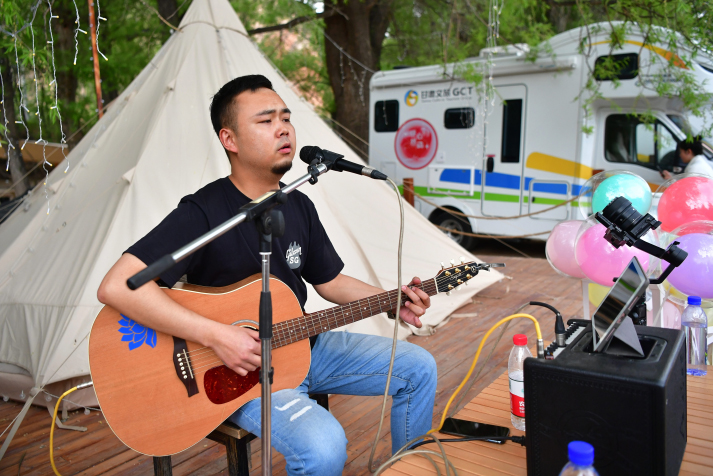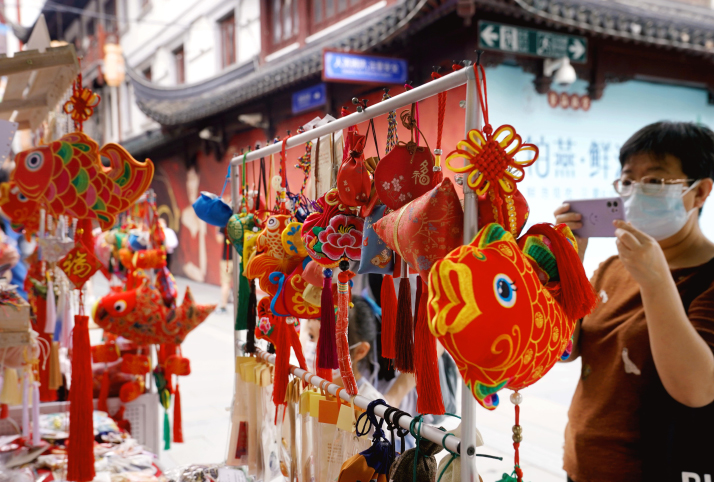| China |
| How COVID-19 control measures have shaped consumption patterns | |
|
|
 A traveler strums a guitar whilst out camping in Yongjing County, Gansu Province, on May 22 (XINHUA)
Twentysomething Lin Lu found himself without a job in June. Previously an advertisement designer, Lin was waiting for the salary increase his boss had promised him a few months earlier. But the combination of pandemic flare-ups since March in Shanghai, where he lives, and several other factors shook the company to its core. Barely able to make ends meet, Lin's boss could only eat his words. Having been unhappy in his job for quite some time already, Lin just quit—without a plan B in place. To reduce his expenses, he decided to tighten the belt. For example, he started cooking instead of ordering in; when grocery shopping, he'd first browse through discounted goods; and he also moved into a cheaper apartment. "I've never lived as frugally as I do now. But this does make me realize that I actually could have saved tons of money had I done this years ago," Lin told Beijing Review. "COVID-19 has changed the way I live and see things. But I do hope things can return to their pre-pandemic state soon." China's consumption levels have seen their fair share of COVID-19-induced ups and downs. Although the nation's consumers are back to shopping, their purchasing patterns reflect a new kind of thinking, according to Bruno Lannes, a partner at the Shanghai office of American consulting firm Bain & Company which focuses on consumer goods and retail sectors. Lannes believes the consumer mindset and shopping behavior have changed, as people are becoming more cautious and price-sensitive.  A shopper takes pictures of Dragon Boat Festival decorative items at a store in Shanghai on June 3 (XINHUA)
The simple life China's fast-moving and ever-changing consumer goods market showed signs of recovery in 2021, but consumer behavior underwent critical changes in the first four months of this year due to new COVID-19 restrictions, according to a joint study by Bain & Company and market research agency Kantar Worldpanel released in June. As major Chinese cities were locked down earlier this year, shoppers began stocking up on food and home plus personal care products, the report said. With almost nowhere to physically go for socializing, they spent less on, for example, high-priced skincare and makeup. Li Yanyan, a young woman working at a leading Internet company in Beijing, used to enjoy "living the high life"—buying expensive makeup, luxury bags, exotic flowers and aromatherapy products. "I bought stuff to relieve the daily pressures of work. But the sense of happiness it brought me was admittedly fleeting," she said. As she was working from home and had to restrict her recreational activities because of pandemic control regulations, she started "living the simple life," which in turn made her rethink her lifestyle. Today, instead of buying foundations and lipsticks that would often end up expiring, she chooses to focus on hobbies that don't cost her a penny—like drawing on her tablet. She recently started participating in the rescue of stray animals. "In the past, I spent my holidays going on shopping sprees at the mall, having brunch with friends at trendy cafes and taking pretty pictures," Li said. "But now, the 'me time' allows me to uncover what makes me feel truly happy and refreshed. And it's not shopping." Zhang Xiaohua, mother of a 6-year-old son and a daughter in middle school in Beijing, said her family would often save up money to go on family outings to amusement parks, some of which have either suspended operation or simply closed their gates altogether. "We have saved thousands of yuan (hundreds of U.S. dollars) in the past months. We go to regular parks more often. Many parents are taking their children there on weekends," Zhang said. Many families also choose to drive to the remote suburbs to enjoy a few days of camping surrounded by natural scenery. The market size of this fashionable activity reached 74.75 billion yuan ($11.14 billion) in 2021, up 62.5 percent from a year earlier, according to a survey by Guangzhou-based market research firm iiMedia. The core market size of China's camping economy is estimated to rise to 248.32 billion yuan ($37 billion) in 2025. On the move The Bain & Company and Kantar Worldpanel reports further indicate that challenging times can generate newfangled opportunities. The rise in at-home consumption will benefit many categories, especially food and beverage, plus health and hygiene products. With the rapidly rising popularity of home workout live-streams, sales of related products are surging on multiple online retail platforms. Online searches for sports and fitness content have gone up by 121 percent year on year so far in 2022, and searches for camping equipment increased by a whopping 204 percent, according to a recent report on China's consumption trends during this year's "618" festival, an annual online shopping event in the lead-up to June 18, jointly released by tech giant Baidu and e-commerce firm JD.com. (The date celebrates the latter's anniversary.) Sales of foam rollers, yoga pants, shoes and bags also exploded. To further encourage people to up their fitness game, several provincial governments issued online coupons to subsidize their residents' consumption. For example, the sports authorities in Hebei Province allocated 5 million yuan ($746,000) for coupons for those who opted to work out at designated sports centers. In the two weeks since this consumption campaign started on June 10, the average daily flow of people to the swimming pool has increased due to consumption-spurring measures, said Li Haixia, head of the Zero Point Swimming and Fitness Club in Renqiu in Hebei, adding the club also launched a range of promo deals to boost business. Besides fitness, retail companies and government departments have also issued coupons for other items such as energy-saving electronic devices, cars and even apartments. In another survey by 51job.com, a leading human resource service provider, respondents held that the negative impact of the epidemic on subsequent consumption is limited, and they were optimistic about the future economy, with 84.3 percent of households believing "the financial situation will get better and the consumption level will increase" in the coming year. Boosting consumption is a systematic undertaking, the basis of which lies in ensuring employment and increasing residents' income, Zhang Liqun, a research fellow with the Development Research Center of the State Council, said. "Under the pandemic's unremitting impact, market players have to deal with increasing difficulties, especially small and microenterprises," he told China Newsweek, adding that to improve consumption, it is necessary to give better play to the leading role of government investment. The government's effective investment in infrastructure, education, medical care and other fields can help enterprises resume production and increase orders, thereby driving employment, increasing residents' income and stimulating consumption. For business to thrive, consumption must pack a punch, not get pinched. (Print Edition Title: The Pandemic Pinch?) Copyedited by Elsbeth van Paridon Comments to luyan@cicgamericas.com |
|
||||||||||||||||||||||||||||||
|
